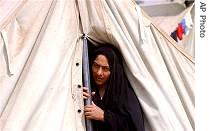2007年VOA标准英语-Violence, Threats Force More Iraqis to Leave Th(在线收听)
By Marissa Melton
Washington
31 January 2007
watch Sean Maroney's report
The International Organization for Migration reports Tuesday that increasing violence in Iraq is forcing more and more people to leave their homes while funding to help them is growing short. VOA's Marissa Melton reports.
 |
| An Iraqi woman at a camp in Diwaniyah, 130 kilometers south of Baghdad |
Data collected by the organization indicated some 360,000 people have left their homes since February 22, 2006, when the bombing of a shrine in the city of Samarra sparked a sustained increase in sectarian violence.
Dana Graber Ladeck, a monitoring and reintegration officer of IOM, said, surprisingly, it is not just fear of sectarian violence that drives Iraqis from their homes.
"The main response that people gave us was that they were experiencing direct threats to their lives," said Dana Graber Ladeck. "This was taking the form of threat letters, texts sent through mobile phones, graffiti written on buildings, and even pamphlets distributed throughout an area telling people they must leave immediately."
According to the report, most Iraqis end up taking shelter with friends or family. Many have rented places to live, but find the cost of rent over time to be more burdensome than expected. About 10 percent of displaced Iraqis are living in abandoned buildings, which may lack electricity, insulation, and water.
The report says the high number of homeless persons has also affected security inside Iraq. Militant fighters sometimes buy the loyalty of displaced persons by providing them some of the things they need, such as food and shelter. And for a displaced child, Ladeck said, the pull to join the fighters can be particularly strong.
"More and more children are joining these armed groups, the militias and the insurgents," said Ladeck. "Sometimes they do it for money and sometimes for revenge, but we're finding more and more child soldiers, so to speak."
Ladeck said the organization has only received a tiny fraction of the $50 million it needs to carry on its activities this year.
The U.S. government funds some of the work of the International Organization for Migration, through USAID and the State Department.
Ellen Sauerbrey, Assistant Secretary for the State Department's Bureau of Population, Refugees, and Migration, earlier this month asked Congress to approve the Bush administration's 2007 request for such funding.
"Our ability to respond to the growing needs depends on receiving sufficient resources," said Ellen Sauerbrey. "The President's 2007 request for Migration and Refugee Assistance included $20 million for Iraqi humanitarian needs."
U.S. Congress has yet to approve that funding, as lawmakers struggle to arrive at a budget for the current fiscal year. The International Organization for Migration says last year Washington contributed $4 million.